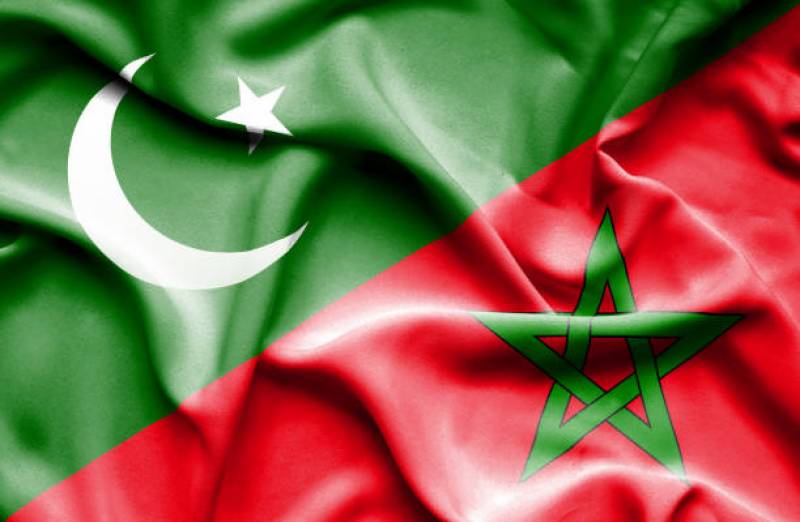Morocco–Pakistan relations have traditionally been strong and cordial. Since its establishment in the 1950s, soon after Pakistan’s independence from the United Kingdom. Morocco maintains an embassy in Islamabad, whilst Pakistan maintains one in Rabat. Both countries have co-operated significantly in the past and continue to widely expand their relations. In the past, Pakistan has said that it does not recognize the self-proclaimed Sahrawi Arab Republic in Western Sahara and that the region’s status is disputed and remains to be decided by UN Resolutions, it showed its support for the Moroccan point of view that the dispute is an internal matter.
In late 2007, the Moroccan Ambassador, Mohammed Rida El Fassi, invited and encouraged Pakistani entrepreneurs and businessmen to take advantage of Morocco’s Free Trade Agreement (FTA) with the US and the European Union (EU), particularly in the textile and readymade garments. In a meeting with the Vice-President of the Federation of Pakistan Chambers of Commerce & Industry (FPCCI), ZubairTufail, the ambassador said that under the FTA, Morocco has free access to readymade garments to the United States, a huge market for garments. “Morocco is a big exporter of readymade garments to Europe, and we invite Pakistani companies to share the Moroccan export to Europe,” Fassi said.
Read more: Morocco team, Atlas Lions, receives heroic welcome in Morocco
The ambassador went on to invite Pakistani companies to set up garment units in Morocco, where even a 30% value addition is acceptable to the European Union. The Vice-President of FPCCI, ZubairTufail, accepted and welcomed the Ambassador’s offer in return and stressed that the private sector of both countries will come closer to opening new possibilities for bilateral trade. Currently, Pakistan’s exports to Morocco stand at US$11.5 million, whilst Moroccan exports to Pakistan stand at US$147 million.
History
When the Treaty of Fez was signed in 1912, Morocco became a French protectorate. But after the Second World War, calls for independence grew stronger. As early as 1943, US President Franklin Roosevelt had encouraged the Sultan of Morocco, Mohammed Ben Youssef, in his quest for independence. From 1947 onwards, Mohammed Ben Youssef began to distance himself from the protectorate, championing the Arab League and supporting Istiqlal, the Independence Party.
However, the appointment of General Alphonse Juin (1947), Chief of Staff of National Defence, then General Augustin Guillaume (1951) as residents-general in Morocco (official representatives of the French Government in Rabat) showed that France was not yet ready to abandon the country. In 1951, General Juin, supported by conservative French colonists, threatened to depose Mohammed Ben Youssef if he refused to dissociate himself from Istiqlal. The Sultan was forced to yield and agreed to distance himself from the nationalists.
But this did not curb their efforts, and they decided to form the Moroccan National Front. Tensions continued to rise over the ensuing months. In 1952 and 1953, several anti-French demonstrations were repressed with bloodshed. In December 1952, the Arab states managed to place the Moroccan question on the UN agenda. But in 1953, El Glaoui, Pasha of Marrakech, a loyal supporter of the French, conspired to have Mohammed Ben Youssef removed from the palace and exiled to Madagascar. The following day, he was replaced by El Glaoui’s choice for successor, Ben Arafa. From that point on, the nationalists stepped up their action and the attacks increased.
Read more: Morocco King invites Moroccan team with mothers for reception
Given the rapid deterioration of the situation, the French Government came under strong international pressure to reinstate the Sultan. Events then began to escalate. On 6 November 1955, French Foreign Minister Antoine Pinay and Mohammed Ben Youssef signed the La Celle-St-Cloud agreements, which led to the independence of Morocco and to the Sultan’s return to the throne as Mohammed V. Ten days later, Mohammed V made his triumphal return to Rabat. Morocco officially gained independence on 2 March 1956 after the signing of a joint declaration in Paris to replace the Treaty of Fez that had established the protectorate in 1912. Tunisia’s turn would come just a few weeks later.
Pakistan’s role
In 1952 when Morocco was under French rule and they were fighting for their independence, Sultan Muhammad 5th sent Ahmed Bulferg to the US to address UN Security Council. However, French delegates did not allow him to speak saying that because Morocco is a French colony, therefore, Ahmed Bulferg being a subject of France cannot speak at the UN forum. At this humiliation of Ahmed Bulferg by the French, Pakistan’s Foreign Minister Sir Zafaullah Khan immediately got the Pakistani embassy in the US opened at night and offered Ahmed Bulferg Pakistani nationality and issued him a Pakistani Passport due which on the next day he able to address the UN Security Council as Pakistani citizen in favor of Morocco. This gave a great boost to the Moroccan independence movement internationally and back home
Finally, when Morocco became independent in 1956, Sultan Muhammad 5th appointed Ahmed Bulferg as Prime Minister of Morocco and he used to hang his framed Pakistani Passport in his office and used proudly tell all the visitors the role that passport played in the independence of Morocco!
However, the potential for cooperation and collaboration is huge and there is a strong need to promote the existing relations to the next stage. Both are important countries and can support each other in many areas of mutual interests and nation-building.
Author: Prof. Engr. Zamir Ahmed Awan, Founding Chair GSRRA, Sinologist (ex-Diplomat), Editor, Analyst, and Non-Resident Fellow of CCG (Center for China and Globalization). (E-mail: awanzamir@yahoo.com).
The views expressed in the article are the author’s own and do not necessarily reflect the editorial policy of Global Village Space.














